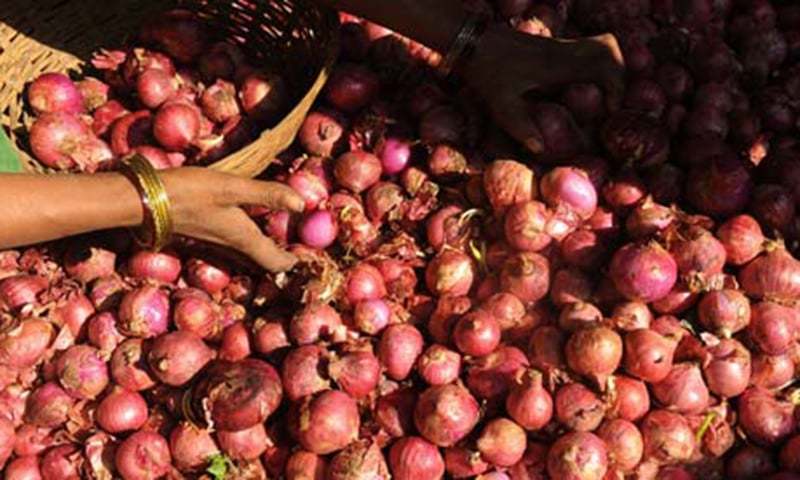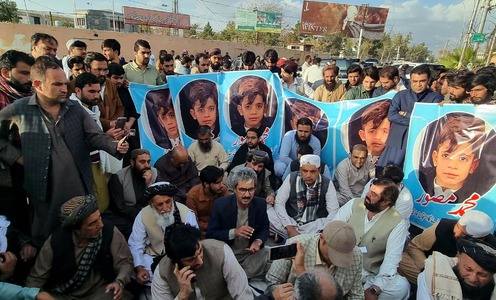ISLAMABAD: Panicked by rising inflation affecting the general public, the government on Wednesday banned export of onions and set a target of wheat procurement for coming season on federal and provincial levels at 8.25 million tonnes at a minimum price of Rs1,365 per 40 kg.
The decisions were taken at a meeting of the Economic Coordination Committee (ECC) of the Cabinet, presided over by Finance Adviser, which stopped short of banning export of chillies and sounded a warning to the market by announcing that 500,000 tonnes of wheat could be imported in case of any shortage during the year.
The ECC also decided that in case of release of wheat stocks from the federal government maintained by Pakistan Agricultural Storage and Services Corporation (Passco) to the provinces, which would be responsible for bearing the burden of incidentals. In this regard, the Khyber Pakhtunkhwa administration is reported to have already agreed to pay incidental charges for 100,000 tonnes of wheat it had received from Passco in recent months.
The decisions about wheat procurement target and its possible import, ban on export of onions or that of chillies were taken without prior movement of formal summaries.
On the other hand, the ECC also gave post facto approval of charging fuel price adjustment (FPA) to farmers with retrospective effect from Jan 1. Sources said the Power Division in consultation with the finance ministry had already applied FPA on power tariff for farming community as determined by the regulator on the ground that this sector was already getting subsidy on electricity rates and hence FPA waiver could not be allowed.
However, it was decided by the ECC that FPA would be restricted to a maximum of Re1 per unit and the adjustment exceeding this limit would be rolled over to the next month.
For “1,263.2 MW RLNG based power generation Project near Trimmu Barrage by Punjab Thermal Power Ltd” the ECC allowed that gas sales agreement should be signed by Sui Northern with Trimmu on the basis of “take or pay” and “as and when available”.
This would mean the scheme would not be bound — like similar LNG-based power projects at Balloki and Haveli Bahadur Shah — to have guaranteed gas supplies and pay for fixed quantities even if failed to utilise committed gas quantities.
The ECC also approved a clarification to be issued by the Ministry of Commerce (MoC) for change in the nomenclature of export-oriented industries under which finance ministry will release within 14 days the subsidy to SNGPL on account of gas supply to five export sectors within two weeks on the receipt of claim by Petroleum Division.
Under a past decision, the supply of gas/RLNG to export-oriented sectors including textile, carpets, leather, sports and surgical goods is made at a fixed rate of $6.5 per unit. SNGPL is issuing at present invoices to these sectors at the Oil and Gas Regulatory Authority notified tariff where subsidy claim (differential of actual tariff and concessional tariff) of the preceding months is submitted on eighth of every month to Petroleum Division.
The Petroleum Division after its processing by the Finance Division will release the difference as subsidy to SNGPL. This involves almost a month from the date of subsidy invoice and actual disbursement to SNGPL while the export-oriented industry pays only $6.5 per mmBtu against actual invoices raised by SNGPL owing to orders of the Lahore High Court.
The petroleum ministry had proposed that the MoC should issue an SRO to change the nomenclature of five zero-rated industries to export-oriented sector, including textile (including jute, carpets, leather, sports and surgical goods). The existing subsidy mechanism will continue till June.
Now, the SNGPL will issue upfront adjusted invoices at a concessional tariff of $6.5 per mmBtu to export consumers and simultaneously raise verified subsidy claims for the differential amount of the preceding month within first eight days and the Finance Division would release the subsidy amount within a week. No interest or late payment surcharge will be applicable on the subsidy amount. This will also streamline the GST mechanism for gas billing to these sectors.
The ECC also approved amendment in Import Policy Order 2016 (SRO 237(1)/2019) under which the Halal logo from the country of origin would continue to be cleared by customs till April 30.
It also allowed import of five controlled chemicals — acetone, anthracitic acid, ethyl ether, hydrochloric acid and sulphuric acid — by commercial importers after the ministries of commerce and narcotics control gave an undertaking that the latter had already developed a foolproof post-clearance mechanism for the commercial importers of the controlled permitted quantity, prohibition to all unregistered entities.
Technical supplementary grants of Rs451.681 million for Naya Pakistan Housing and Development Authority, Rs110m in favour of planning ministry for Afghan Projects, Rs5.9m for capacity building of teachers training institutes and training of elementary teachers in former Fata, GB, AJK, and ICT were also okayed.
Published in Dawn, February 20th, 2020












































